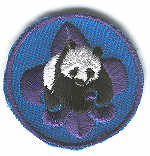


Provincial

9th Welland Venture Company

World Conservation Award
Requirements
1.What constitutes the natural environment? As a group, discover the answer with your advisor and / or a specialist in the field, and find out the effect that mankind has on this environment. Explain how man is disturbing the balance of nature, and what we must do to regain the essential balance. Include some of these discussion points:
-
the meaning of such terms as ecology conservation, environment, balance of nature, life cycle, food chain, biocides, recycling, photosynthesis, organic and inorganic material, biodegradable materials, humus, carrying capacity, and non-renewable material;
-
the effects of fire, deforestation, overgrazing, soil erosion, water pollution, air pollution, and the effects of man in general (over population, tourism, etc);
-
how the extinction of animal and plant species affects the ecological balance;
-
the benefits of predatory birds or mammals;
-
the impact of human hunting activities and that of predators (analyze and evaluate any differences); and
-
how oxygen moves in a cycle through nature.
2. Take part in at least two environmental activities, including studying an environmental problem, its cause and possible remedial action. (you may co-operate with other agencies.) Support your field work report with photographs, maps, sketches, and other evidence.
-
draw up a map of legal garbage dumps in your community, and make this map generally available to the public;
-
find an area with "natural green" in your community, and identify and evaluate its particular features;
-
obtain, adopt and develop a piece of land as a nature reserve, or help the owner of a reserve to manage it;
-
play an active role in a local, national or international conservation project;
-
take part in a project that improves or beautifies a local area;
-
carry out a camera safari, then display your evidence of animal life or interesting vegetation;
-
carry out a boat expedition that studies wild fowl or pollution; and
-
carry out a conservation information project including, for example, gathering public opinion, printing of handouts, arranging a public display, or making exhibitions.
3. Become aware of major conservation organizations and institutions in Canada and in the world. On a map show and learn about the major nature reserves in Canada, and why they have been created. Know where to obtain information on federal and provincial conservation laws.
|
|
|
|

|
|
|

|
|
|

|
|
|

|
|
|
 |
|
|
|
|




